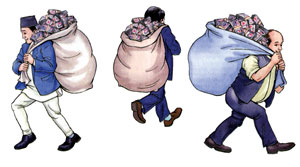 KRISHNAGOPLA |
Instead of consulting people, plans are dictated by the parties who distribute the projects among one another and the share the benefits. Last year in Lalitpur more than 100 urban planning projects were divided among the three main parties. Local Development Minister, Top Bahadur Rayamajhi is not happy with the workings of the all-party mechanism and agrees: "It has done more harm than good."
In Bhaktapur, local leaders have violated existing laws and regulations while fixing tax rates for land sales. Last year, Rs 1.5 million was distributed in Bhairawa among parties, their sister organisations and NGOs of questionable repute. In Dadeldhura, the UML's Birendra Shahi has openly admitted to pocketing projects up to Rs 20 million.
Funds allocated for development projects are mostly hijacked and embezzled by corrupt political appointees because of which majority of them remain incomplete. A few months back, villagers in Kavre pelted stones at DDC staff and local politicians accusing them of sidetracking the district's development budget. regularities. "We had hoped local bodies would help devolve power but all they seemed to have done is decentralised corruption," ex-secretary Khemraj Nepal said.


